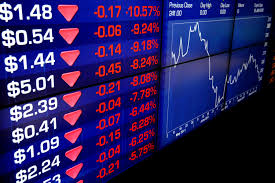
It often takes a while before people start to notice.
It's the one global central bankers, government bureaucrats and their media apologists hoped people would never get--this economic boat's got a big hole in its side. A lot of people, some reported to be pretty smart, see rough global seas ahead. Sovereign bond yields, if they get any lower, they'll join whale dung and that rests on the ocean's bottom.
The UK now offers a 50 year gilt with a yield lower than that mysterious 2% inflation number central banker have been sniffing around for nearly a decade or more. The Chinese economy is still searching for a cliff to fall off despite what, if it were being pushed in any other venue than finance, would be one of the world's greatest cover-up stories.
Let's look at the Janet Yellen Fed. A year ago she was positive the U.S. economy was recovering, hiked rates 25 basis points and the stock market went into a tizzy, probably just to see what she would do. And she did what they thought--caved. Now a year later she and her minions were out talking up rate hikes when some rotten job numbers broadsided her. True to form she tries to play the numbers down, as does many of her apologists.
There's an old line in poker about if after an hour or so, you don't know who the patsy is, you're it. Yellen looks more and more in her stumbling, fumbling fashion the hand picked patsy to take the blame when Humpty Dumpty finally takes his fall. It happens to those who are usually in over their heads. There's another sign here with the recent push back in Japan against negative interest rates or ZIRP.
To be sure, MSM true to their code will attempt to soften it. In 1993 Coke Cola offered a bond with a 7.31% coupon that matures in 2093. That's right. It has a 100 year maturity date. Few thought tying their money up for 100 years even at that rate was a good idea. Twenty-three years later those who did are looking like bond gurus. The bond recently traded around $1,310.00 but it's 52 week high is somewhere in the $1,540.00 range.
If you listen to people like Mohamed El-Erian, one of the premier apologists for the Bernanke-Yellen Fed, he loves the term "inadvertently" when discussing them. In his newest book,
The Only Game In Town, he uses it more than once to describe the Fed. He also throws around the term inherited and attempts to slide this gem by his readers. The Fed didn't know or purposely choose to destroy the COLA crowd and the poor when they decided to create and keep artificially low interest rates for so long.
In his twisted economic view it was a courageous save The Good Ship Globe from sinking act. For people who are supposed to have an economic fix on events these folks spend an inordinate amount of time, it seems, flying on Inadvertent Airways. Here's just one pathetic example:
With the world suffering significant damage and dangerously standing on the edge of an even greater calamity as a result of financial irresponsibility, it was only a matter of time until the blame game started in earnest. Banks would find themselves in the direct line of fire, of course, and understandably so. Central banks would also be targeted, if only because they had evolved--inadvertently--into naive enablers of malfeasance.
It's old news now but hedge fund icon George Soros has after a long hiatus returned to trading
. Supposedly he has some concerns about China and he's buying gold and some commodities and selling equities. A while back we noted that real estate tycoon Sam Zell as reported was unloading his real estate holding after their big run-up. Stanley Druckenmiller, a former Soros associate and a pretty good hedge fund guy himself, recently expressed similar views. Two more well known Wall Street giants, Leon Cooperman and Carl Icahn, lately chimed in with comparable refrains.
We're not suggesting for a moment that these well known investors are right and people like Janet Yellen and El-Erian are wrong. We just saying they both can't be right. And won't be. In the investing world some people call that decision time.




